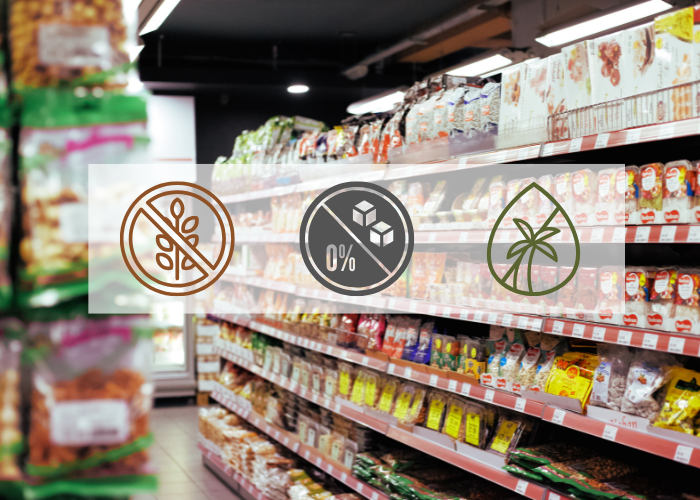Growth of the ‘free from’ market, over 8 billion euros in 2023By Erika Loh
- 21 November 2024
- Posted by: Competere
- Category: Senza categoria

- In recent years, food labels have shown a shift in trends: products labeled “with the addition of” have decreased, leaving room for those marked “without”.
- In 2023, the market for “free from” products exceeded 8 billion euros, with a 9.7% increase in sales, despite a decrease in volumes.
- While some labels are justified by real health needs, others are misleading. This is the case in claims such as “without palm oil”.
Have you ever wondered why supermarket shelves today more often feature products labeled “without” rather than “with the addition of”? In the 2000s, food labels aimed to highlight what was added to products to meet consumer desires with ingredients that promised benefits. Today, absence is the trend: “gluten-free,” “sugar-free,” “palm oil-free,” “salt-free.” “Free from” foods are formulated without certain ingredients that may cause allergies, intolerances, or are avoided due to personal choices or medical advice. But beware—not everything labeled “without” is necessarily better.
It’s important to differentiate: while labels like “gluten-free” are justified by real and scientifically proven health needs, others are often exploited misleadingly. A case in point is the “palm oil-free” label, which implies—without any scientific basis—that the product is healthier. This type of labeling is problematic because it erroneously suggests that palm oil is harmful, even though its nutritional and sustainability characteristics are recognized. Of course, this applies only within a balanced diet—just as it does for any food.
According to the latest report from Osservatorio Immagino, more than 14,000 “free from” products were sold in 2023, generating over €8 billion in revenue in supermarkets and hypermarkets. Compared to the previous year, “free from” products saw a 9.7% increase in sales despite a 3.5% drop in volume. This apparent paradox is attributed to inflation in the food sector, which has driven price increases.
THE DARK SIDE OF “FREE FROM” LABELS
Despite its benefits, the “free from” label can be misleading and confuse consumers. The “without” claim can lead people to believe that the absence of an ingredient automatically makes a product healthier or more environmentally friendly compared to products “with” the ingredient. Otherwise, why explicitly mention it?
For example, many consumers choose gluten-free products without any medical necessity, thinking they are healthier. But why should gluten be considered harmful or less healthy for those who are not celiac? Simply because gluten-free products appear healthier than those containing gluten.
This phenomenon is known as the “halo effect”, where consumers focus on the label rather than the absent ingredient. As a result, they rely on the labels without developing a deeper understanding of nutrition.
THE “PALM OIL-FREE” LABEL: AN ILLUSION OF HEALTH AND SUSTAINABILITY
One of the most affected products by the halo effect of the “free from” label is palm oil. “Palm oil-free” products rank third among the most requested “free from” items (according to Osservatorio Immagino), representing 2.9% of the entire “free from” market and 4.3% of total sales. The top-ranked items are “preservative-free” foods (7.9% of sales and 4.9% of products), followed by the claim “low fat” (5.2% of sales and 3.6% of products).
In 2023, “palm oil-free” products generated over €1.5 billion in sales, with 2,513 products produced. Compared to the previous year, they recorded an 8.3% increase in revenue but saw a 5.0% decline in volume. Despite a 4.5% drop in supply, demand remained positive, growing by 12.8%.
While purchases of “palm oil-free” products have significantly decreased since 2018, prejudice against this ingredient remains strong, as evidenced by these rankings. Yet, as revealed by a study from the For Free Choice Institute, most products containing palm oil have similar or even lower levels of saturated fats compared to those labeled “palm oil-free.” Additionally, palm oil is more sustainable than its substitutes.
HOW TO COUNTER MISLEADING “FREE FROM” LABELS
The “palm oil-free” label is intentionally misleading, aiming to boost sales while reinforcing an unscientific bias against palm oil—a resource relied upon by many small to medium-sized producers in developing countries.
Although the volume of “palm oil-free” product sales is declining, it remains significant. To accelerate change, it is crucial to educate consumers about ingredients and their nutritional implications. Instead of opting for “palm oil-free” products, consumers should be encouraged to choose foods made with “sustainable palm oil”, produced according to responsible practices with a lower environmental impact compared to other alternatives.
Furthermore, misleading marketing practices must be curtailed. The Ministry of Enterprises and Made in Italy is working to ensure that manufacturers address consumer expectations regarding “free from” claims and their informational consequences. Labels must be clear and scientifically based to avoid consumer confusion and promote more informed food choices.
Read Certify, don’t replace: the path to sustainable palm oil>>>
